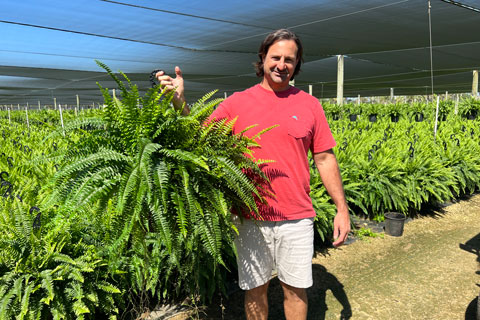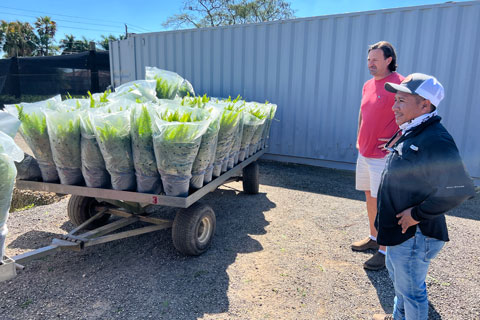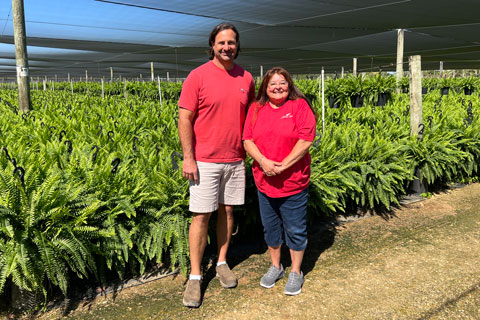6/1/2023
At Home in Homestead
Jennifer Zurko

If you grow up in Homestead, Florida, it shouldn’t be a surprise if you end up wanting a foliage operation of your own.
That’s how Andersen Farms came to be in 2010. Born and raised in Homestead, Eric Andersen was raised surrounded by tropical foliage growers, nurseries and landscapers on every corner. He started growing his own plants at the age of 19, and although he tried his hand at other careers, he was drawn back to horticulture. What started as 2.5 acres to grow Boston ferns has developed into a full-fledged growing operation of 124 acres in nine different locations within one mile of each other.
Pictured: Eric Andersen holding a Boston fern—the plant that helped launch his business 13 years ago. Andersen Farms grows 895,000 ferns that are shipped around the country and into Canada.
I got to scoot around Andersen Farms with Eric and team member Rita Sutton in a golf cart on a sunny weekday in early March—the best time to see ferns, palms and other interesting tropicals getting ready to be shipped around the country.
Foliage forward
The current iteration of Andersen Farms is Eric’s second go-round. In 1992, Hurricane Andrew hit southern Florida, decimating many of the local growing operations. This, Eric said, was a life-changing experience for him. He was 16 years old at the time. After graduating from high school, and while he was attending art school, he decided to open his own plant business. Unfortunately, it was a struggle and he closed it shortly after.
Eric dabbled in real estate for a bit, but then started growing again—just a few ferns—but it presented him a chance to re-open his plant business. For the past 13 years, Andersen Farms has been a supplier for supermarkets, garden centers, brokers, wholesalers, big box stores and interiorscapers.
 Eric said, “Our doors are always open to all businesses,” and he sells a lot to a number of different customers: 770,000 10-in. and 125,000 12-in. Boston ferns, 300,000 Majesty palms, 8-in. florist-quality Philodendron cordatum, over 100 varieties of 6-, 10- and 12-in. premium exotic foliage, and 25 varieties of 8-in. foliage hanging baskets.
Eric said, “Our doors are always open to all businesses,” and he sells a lot to a number of different customers: 770,000 10-in. and 125,000 12-in. Boston ferns, 300,000 Majesty palms, 8-in. florist-quality Philodendron cordatum, over 100 varieties of 6-, 10- and 12-in. premium exotic foliage, and 25 varieties of 8-in. foliage hanging baskets.
He said his customer list has been growing every year and it’s because of “a giant team effort. We’re always looking for new varieties to introduce to the market and remain customer focused.”
Pictured: Eric with his right-hand-man Ramón Juarez, who runs a staff of 65 people.
Philodendron Imperial Gold, which he grows from tissue culture, is a two-year project that started during COVID where there were a lot of shortages on certain foliage varieties. Alocasia Hilo Beauty features unique yellow markings. And the team at Andersen Farms has been working on building a 10- and 12-in. patio program that also includes 6- to 7-ft. Majesty palms, assorted alocasias, Lyrata Fiddle Leaf standards, philodendrons and more.
There are limits to how you grow and harvest Majesty palms (Ravenea rivularis), so Andersen Farms has earned CITES (Convention on International Trade in Endangered Species & Fauna) certification so that they can produce and ship them into Canada. Majesty palms were put on the endangered fauna list because growers would cut down the whole tree instead of just harvesting the seed for replanting. To get a 10-in. Majesty palm, it takes one year to grow 4 ft., so it’s a long crop time.
The houseplant boom during the pandemic has helped elevate his success, obviously, but with that also came supply issues. Eric said that as more cultivars become available as tissue culture it’s helped to bring more unique plants to market faster. He’s also noticed that there’s much more of a focus on breeding, too—especially with variegated products.
Community counts
The area is a hot bed (literally—it gets hot there!) of tropicals and foliage growers, but the Andersens didn’t originally make their name in horticulture. The family has owned a local corner store for 80 years that was originally built in 1912 as a dance hall. There have been many buildings and uses for the land through the years—there was a church where the gas pumps currently stand until it blew down in a hurricane in 1935. The dance hall also changed into a daycare center and later a women’s hall until the Andersens bought it in 1943. Today, Eric’s father David still owns and runs it with Eric’s brother John.
 Pictured: Eric with team member Rita Sutton, who worked for over 40 years in the Homestead growing business and was fully retired when he called her up to see if she’d like to help him out part time. She’s been at Andersen Farms for over two years now, helping out wherever and whenever Eric needs it.
Pictured: Eric with team member Rita Sutton, who worked for over 40 years in the Homestead growing business and was fully retired when he called her up to see if she’d like to help him out part time. She’s been at Andersen Farms for over two years now, helping out wherever and whenever Eric needs it.
Eric said he gets his entrepreneurial work ethic from his parents, who taught him that hard work pays off. His experience in real estate has provided a different perspective for him and he’s been inspired by other famous business owners, as well.
“A lot of stuff you learn in between the mistakes,” Eric said. “It’s what helps you grow.”
Last year, Andersen Farms held its first open house for the public to come and learn about the business and buy some plants. Word of mouth spread quickly, with more than 250 people who came—some from hours away. The team created a little “store” that people could purchase from and Eric said he enjoyed observing which plants drew their interest and hearing their comments.
It’s a great example of how Eric is giving back to the community that helped raise him.
“I’m building a brand with Andersen Farms,” he said. “And I want to continue to build on that brand even more.”
Watch a drone video of Andersen Farms.
Andersen Farms’ Mission for Its Employees
• To cultivate a family culture that enables employees to have a better, safe life to grow.
• It’s a “home away from home.”
• The goal is for the company to be a happy place.
• Care about the lives and families of the employees.
• Create and desire a “family culture.” Eric said he wants them to grow, be inspired and look to the business for their long-term careers and value.
• Care about the livelihood experience in the environment and the employees’ contribution to the business. Eric wants his employees to always be evolving and growing, and to make better versions of themselves.
• Have fun! With company barbecues, appreciation lunches, holiday parties, pick-up basketball and soccer games, and always with music and good food. GT